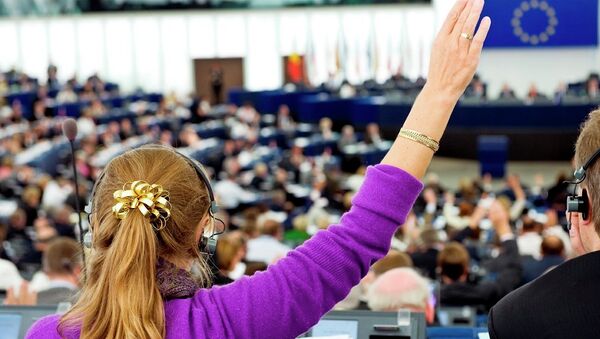According to lawyers at ClientEarth, the new law has been moulded by corporations like Michelin and lobbyists Business Europe, among others, with almost no input from organizations working to protect public health.
On Tuesday, the European Parliament's legal affairs committee has the opportunity to change the proposal before it is finally adopted by the European Parliament in plenary.
#tradesecrets vote today — policymakers must protect consumers, journalists, #whistleblowers http://t.co/6edEIROAeR pic.twitter.com/rW0NvarScw
— ClientEarth (@ClientEarth) June 16, 2015
ClientEarth lawyer Anaïs Berthier told Sputnik:
"MEPs must vote to ensure information on the health and environmental impacts of products is not withheld by industry, and that the people revealing this information are not sued before the courts."
If the law is not changed by the vote, ClientEarth say it will allow companies to sue anyone who reveals industry malpractice, including whistleblowers, journalists and even public authorities.
Why the new EU directive on trade secrets protection is a threat to media freedom — Europe — EBR: http://t.co/H31TnyHjJW
— Renate Schroeder (@renatemargot) June 16, 2015
"This makes the EU's job even more difficult. Public authorities face huge industry pressure not to release information on emissions, clinical trials and food safety, even when they are legally obliged to do so. This law gives companies even more power over public authorities and threatens our right to know what's in the products we use every day," Berthier told Sputnik.
Protect journalists from Trade Secrets Directive, French MPs say | EurActiv http://t.co/EKOkdXBk9q @ce_aarhus #ce pic.twitter.com/dBFMMvFVnV
— ClientEarth (@ClientEarth) June 12, 2015
Secrets Behind the Flu Vaccine
Much of the information defined by companies as 'secret' is highly relevant to the public. Tamiflu was stock-piled by EU governments to treat swine flu in 2009-2010, despite being ineffective at treating serious influenza complications. The drug's shortcomings only came to light because Cochrane Collaboration fought for access to Roche's clinical trial data. Without substantial amendments, the Trade Secrets Directive could result in companies successfully withholding such data in future.
EU trade secrets directive threatens to silence whistleblowers + journalists from disclosing corporate wrongdoing: http://t.co/xuGYyipWon
— Maira Sutton (@maira) June 15, 2015
Critics say the Trade Secrets Directive conflicts with the EU's commitment on access to information. As a signatory to the Aarhus Convention, the EU has guaranteed people access to business information affecting health and the environment. But with no reference to the convention in the new law, they say there is a very real chance public authorities will play it safe and not release information, to avoid the risk of being sued.
Suddenly getting lots of e-mails telling me that the #tradesecrets directive we'll be voting on Tuesday is too vague. Couldn't agree more!
— Julia Reda (@Senficon) June 11, 2015
Following a consultation, the Commission proposed new rules to protect businesses from trade secret theft in late 2013. Since then, debates in the EU industry committee, the internal market committee and the legal affairs committee, which leads on the file, have shaped the draft law.
On Tuesday, MEPs in the legal affairs committee will vote on the final form of the draft directive and pass it to the European Parliament for debate. EU Parliament will vote on the draft law in July, then it will go to the Council of Ministers for consideration. The Council, made up of one minister from each of the 28 EU countries, is likely to adopt the directive; it will then become law. This means the directive which emerges from the legal affairs committee vote on 16 June is likely to be very close to the final law.




